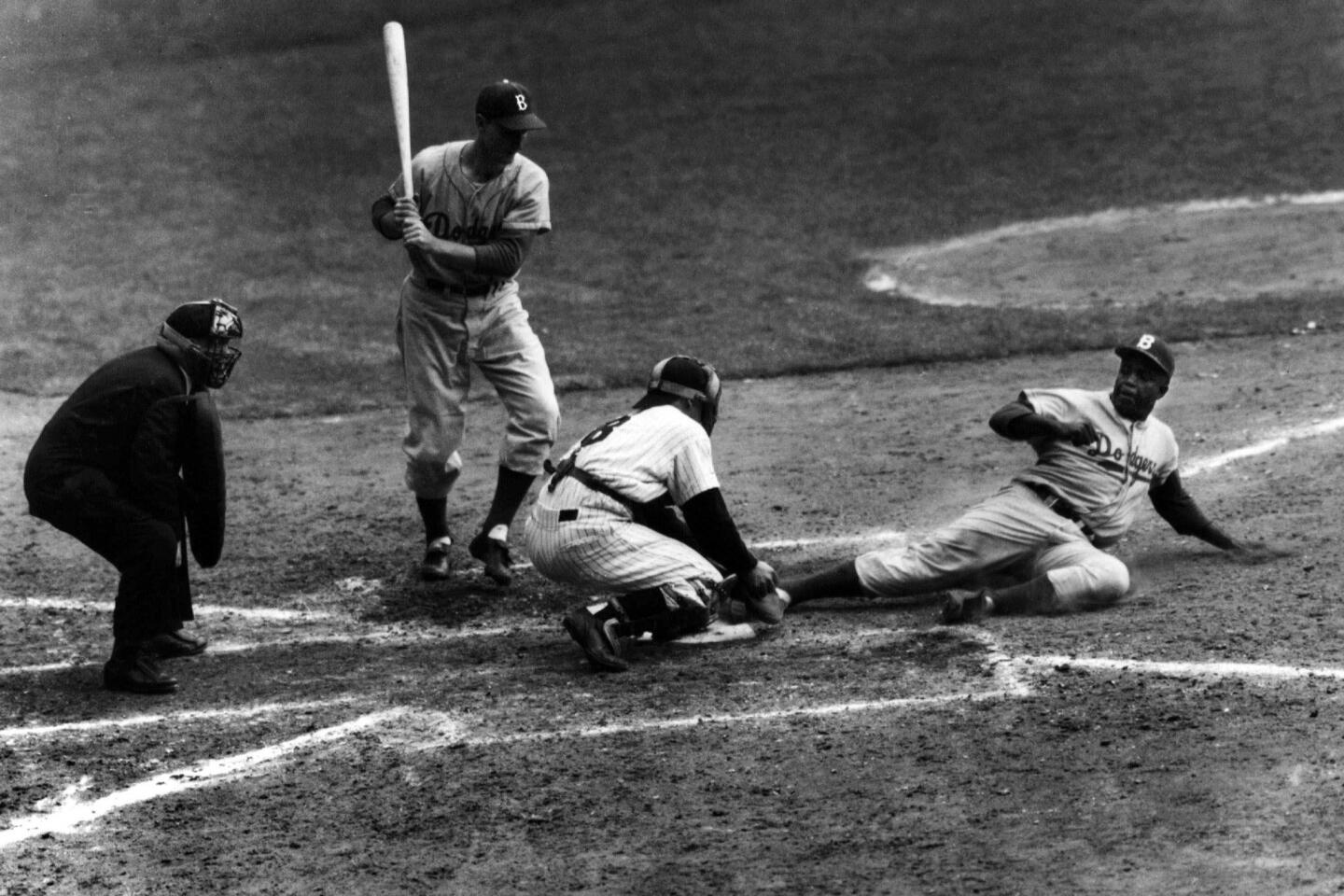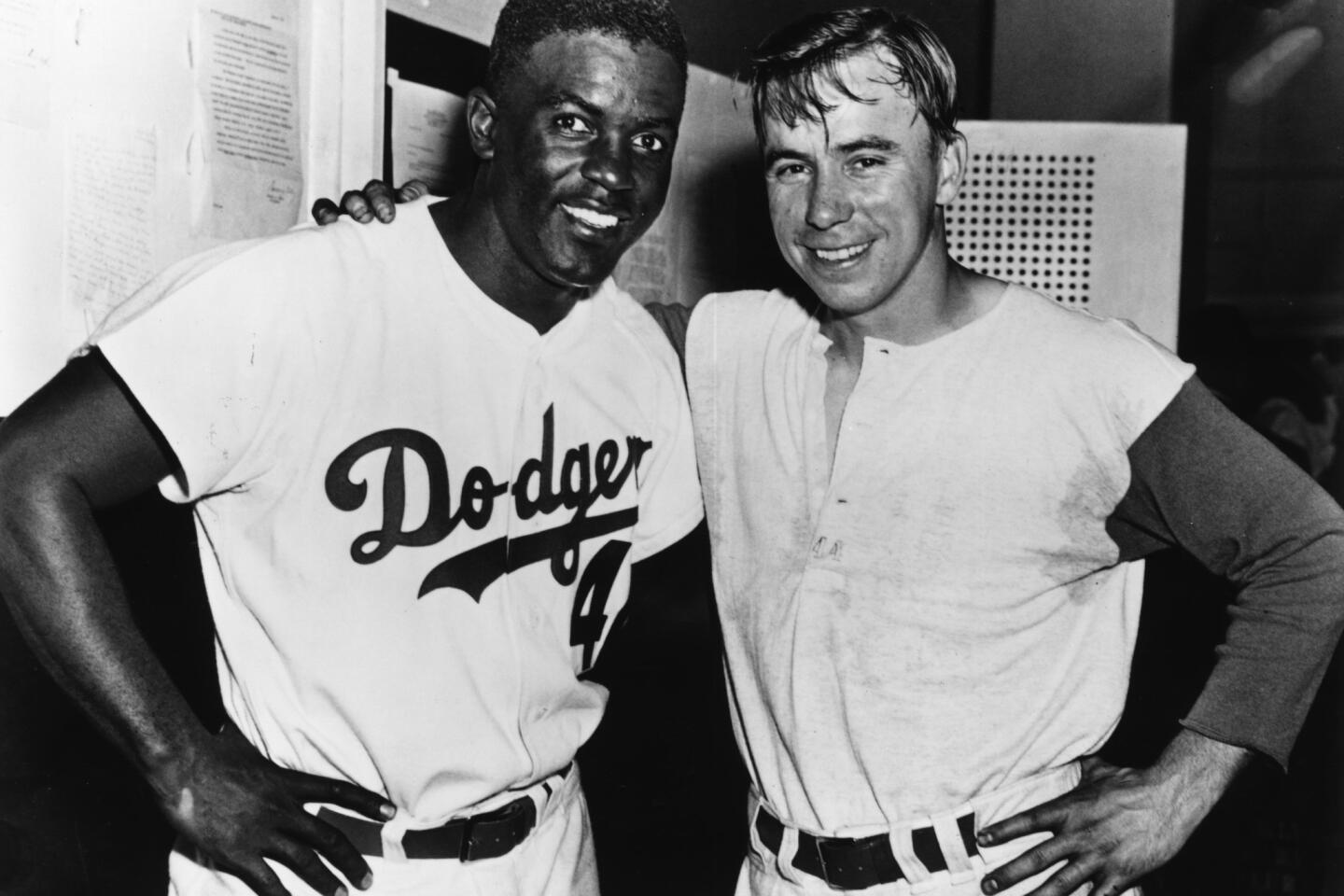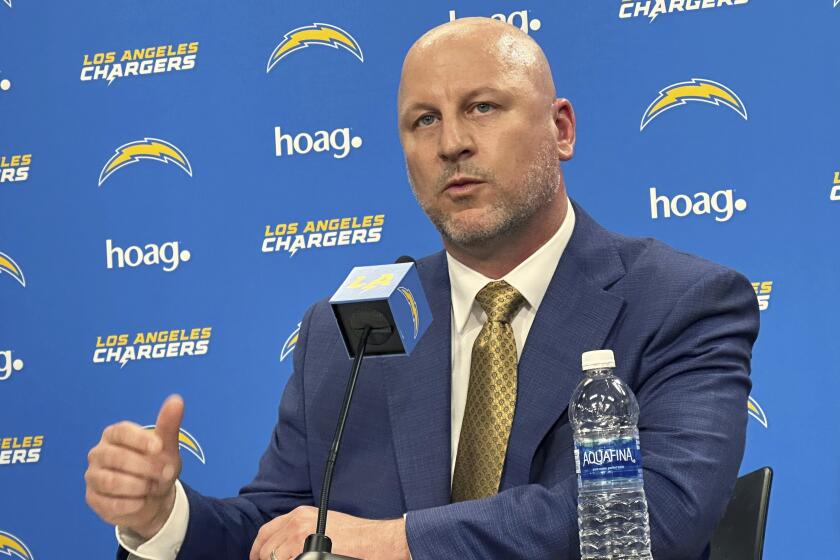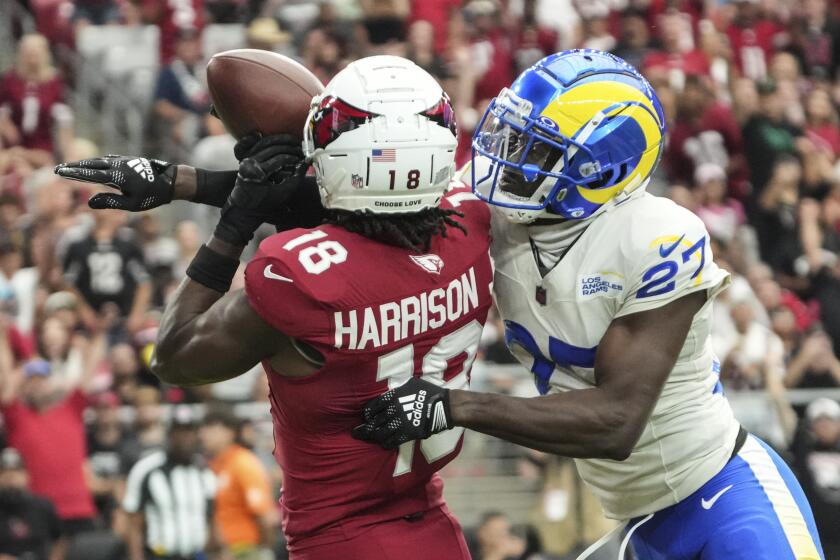Dodgers to unveil Jackie Robinson statue Saturday
Jackie Robinson is immortalized by statues in Canada, Connecticut, Florida and New Jersey, and by two statues in New York. The UCLA baseball stadium, which is named in his honor, also features a statue of him.
On Saturday, the most historic Dodger gets a statue at Dodger Stadium. On the 70th anniversary of the day he broke baseball’s color barrier, and in the 55th year of their beloved home grounds, the Dodgers will dedicate their first stadium statue.
Sharon Robinson, Jackie’s daughter, said she expects about 200 friends and family members — including her 94-year-old mother, Rachel — to attend the unveiling and ceremony on baseball’s annual Jackie Robinson Day.
A statue of Willie Mays greets San Francisco Giants fans at the plaza outside AT&T Park, and a statue of Tony Gwynn towers over the park behind San Diego’s Petco Park. Dodger Stadium, with its multiple-level entrances, has no such natural gathering spot.
So the Dodgers will install the larger-than-life Robinson statue near the reserve level entrances, along the left-field line.
“It’s where the most number of fans enter,” said Janet Marie Smith, the Dodgers’ senior vice president of planning and development, “but it’s also a very ceremonial place, with beautiful views of downtown Los Angeles in one direction and Elysian Park in the other.
“So the backdrop to the sculpture — no matter what angle — is a very powerful one, and tells a story of Los Angeles.”
The statue, in which sculptor Branly Cadet depicts Robinson sliding to complete a steal of home plate, is the focal point of a display that highlights his Hall of Fame career as well as his social impact. Although Robinson told the Hall of Fame he wanted to be remembered there as a baseball player, the Dodgers also want to celebrate his place in American history.
Robinson stole home on 19 occasions, including Game 1 of the 1955 World Series, when the Brooklyn Dodgers won their lone championship. Robinson retired before the 1957 season, one year before the Dodgers moved to Los Angeles.
“Jackie Robinson was known for stealing home. ... It takes courage and precise timing to steal home.”
— Sculptor Branly Cadet
“Jackie Robinson was known for stealing home,” Cadet said. “Home plate is a highly guarded space on the baseball field. It takes courage and precise timing to steal home.
“From a historical perspective, I think those qualities impressed everyone who was involved in breaking the color line.”
Sharon Robinson said she appreciated that the Oakland-based Cadet visited the Robinson family in New York for consultation and said she “respected the artist’s vision” for the statue.
“I love the way Branly depicted him in his aggressive stance, going into a slide,” Robinson said. “That’s what he brought to Major League Baseball and what he learned from the Negro Leagues, to be a more aggressive baserunner.”
The word “courage” appears on the inscriptions of three of the seven previously installed statues.
None cite the National League most-valuable-player award he won in 1949. Two portray him playing baseball, neither with a majestic swing. Two portray him sharing a baseball with children. One shows him in the embrace of a teammate.
Among statue locations are the site of Robinson’s first exhibition game (Daytona Beach, Fla.), his first minor league game (Jersey City, N.J.), his first minor league season (Montreal) and his first major league season (Brooklyn).
The presentation of those statues purposefully minimizes Robinson’s role as a baseball player, said Chris Stride, who collected the Robinson data for his study of sports statues at the University of Sheffield in England.
“The many monuments to Jackie Robinson reflect not only his critical and courageous role in driving profound social change, but also the desire of communities to celebrate both Robinson’s achievements and their part in his story,” Stride said via email.
“Each of the statues, given their location, reflects the totality of the man,” Sharon Robinson said. “With Dodger Stadium, it’s totally appropriate that it be a story of his baseball-playing years, and that the sculpture would reflect that.
I’m not concerned with your liking or disliking me. All I ask is that you respect me as a human being.
— Jackie Robinson, as quoted on his new statue at Dodger Stadium
“They have found ways, by using some of my father’s quotes, to bring in his humanitarian approach to life and his emphasis on social change. I really think this sculpture brings the two things together.”
In 1962, when Jackie Robinson was inducted into the Hall of Fame, he said he wanted to be recognized solely for his impact on the field. His Hall of Fame plaque, in reflecting his wishes, accounted for statistics that included batting average, stolen bases, fielding percentage and double plays turned, but did not say he broke baseball’s color barrier.
In 2008, more than three decades after he died and one decade after his number 42 had been retired throughout the sport, the Hall of Fame received the support of Robinson’s family to revise his plaque, which now ends with: “Displayed tremendous courage and poise in 1947 when he integrated the modern major leagues in the face of intense adversity.”
The Dodger Stadium statue will include information about his playing career as well as inscriptions of these Robinson sayings, as selected by the Robinson family:
• “A life is not important except in the impact it has on other lives.”
• “I’m not concerned with your liking or disliking me. All I ask is that you respect me as a human being.”
• “There’s not an American in this country free until every one of us is free.”
Although Dodgers president Stan Kasten has suggested Robinson’s statue would be the first rather than the only one at Dodger Stadium, Smith said she is not aware of any decision about who might come next. Vin Scully, Sandy Koufax and Fernando Valenzuela would be among the candidates.
When Smith arrived with the current ownership group in 2012, she said Kasten charged her with decorating Dodger Stadium with the history of the storied franchise. The concourses of Dodger Stadium now feature MVP and Cy Young awards, old stadium seats and signs, a Scully display case, and even equipment trunks and bullpen carts.
“The idea of the sculpture is an extension of that,” Smith said. “We feel this is not just a Dodger monument, but one that all of baseball will embrace and respect. We’re honored to be able to present it.”
Follow Bill Shaikin on Twitter @BillShaikin
More to Read
Go beyond the scoreboard
Get the latest on L.A.'s teams in the daily Sports Report newsletter.
You may occasionally receive promotional content from the Los Angeles Times.













